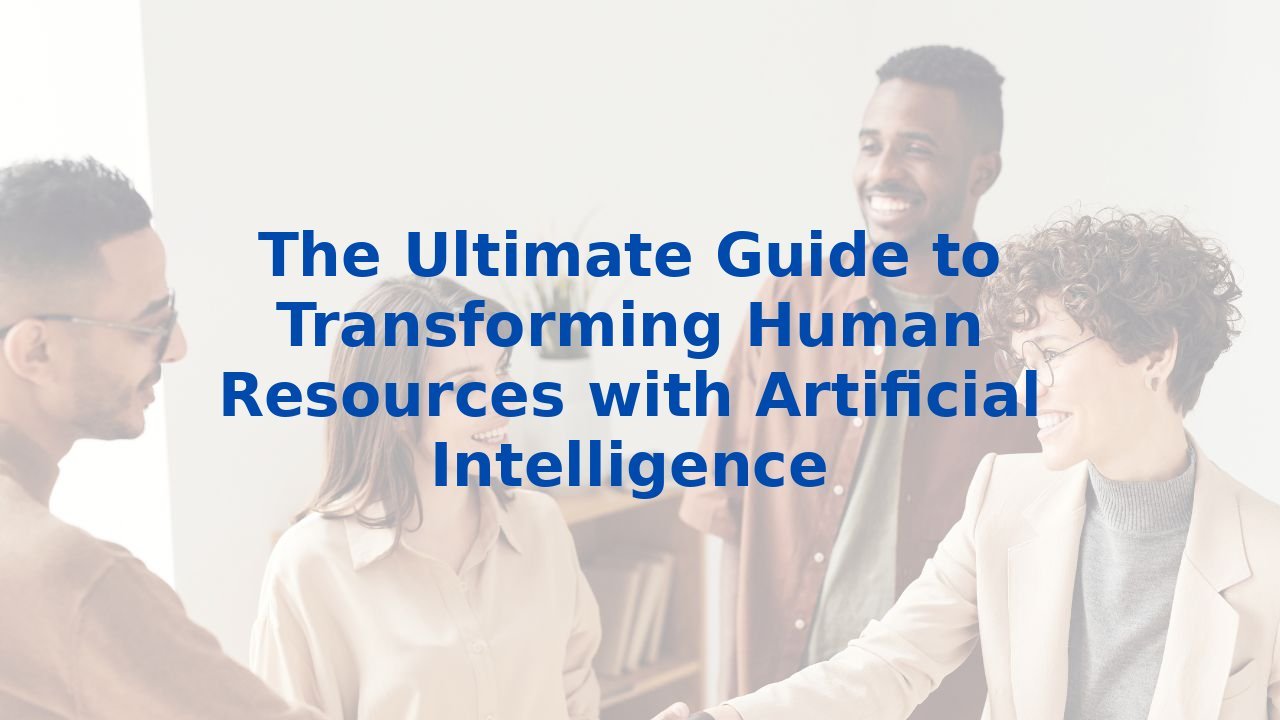The Ultimate Guide to Transforming Human Resources with Artificial Intelligence
The Ultimate Guide to Transforming Human Resources with Artificial Intelligence
Artificial Intelligence (AI) is on the precipice of revolutionizing the field of Human Resources (HR). We're not merely witnessing a trend; we are amidst a transformation that promises unprecedented opportunities for businesses to enhance efficiency, elevate decision-making processes, and boost employee engagement. As HR professionals adapt to these innovative technologies, it is essential to understand how AI can redefine traditional HR practices while fostering a culture of adaptive learning.
Streamlining Recruitment
Gone are the days of sifting through innumerable resumes and cover letters. AI is changing the recruitment landscape by automating the candidate screening process. Leveraging AI-powered tools, HR professionals can now analyze resumes with a level of efficiency that humans alone could never achieve. Not only does this save time, but it also actively mitigates unconscious biases that often cloud the hiring process. By automating these repetitive tasks, HR teams can redirect their energy towards high-value activities such as candidate mentoring and strategic planning.
Enhancing Employee Experience
AI doesn’t just streamline hiring; it also personalizes the employee experience in a way that enhances satisfaction and productivity. Imagine an employee's first day being seamlessly guided by AI. From suggesting training modules tailored to individual strengths to providing 24/7 chatbot support for immediate HR-related queries, the possibilities are vast. This level of personalization, once seen as an aspiration, is now rapidly becoming the norm. New hires benefit from customized onboarding experiences that not only facilitate better integration into the workplace but also set the stage for long-term success.
Predictive Analytics
Think of predictive analytics in HR as your crystal ball—one that can forecast not just future hiring needs but also predict employee turnover and provide vital insights into employee performance. This world of data-driven insights allows HR teams to transition from a reactive to a proactive posture. Imagine being equipped to take strategic decisions based on a thorough analysis of patterns and trends hidden within large datasets, all thanks to AI. This demonstrates how organizations can make informed choices that align with overarching business objectives.
Ethical Considerations
With great power comes great responsibility. The integration of AI into HR processes presents crucial ethical considerations concerning privacy, consent, and fairness. As organizations harness the capabilities of AI, they must also establish robust policies to ensure transparency and maintain trust among employees. This commitment to ethical practices is critical. By ensuring that AI tools are free from biases and are respectful of employee data privacy, organizations not only fulfill their moral obligations but also create an atmosphere where innovation can thrive.
The Future of Work
The adoption of AI in HR is just the beginning of a much larger evolution. As technology continues to make strides, we can expect a plethora of innovative applications that will further revolutionize the workplace. To truly reap these benefits, organizations must cultivate a culture of agility and continuous learning. This readiness will empower employees to adapt successfully to emerging technologies and new roles. The future isn't just about AI itself; it’s about investing in digital infrastructures and ensuring that ethical considerations are at the forefront of this journey.
Benefits of Training Your Employees for AI
Training employees to effectively use AI tools is imperative for any organization aiming to truly integrate AI within its HR framework. Here are some compelling reasons to invest in such training:
Enhanced Decision-Making: Trained HR professionals are equipped to interpret insights drawn from AI, enabling them to make strategic decisions that align closely with organizational goals.
Improved Efficiency: When HR teams understand how to utilize AI effectively, they can streamline administrative processes, allowing them to devote time to higher-value activities.
Better Integration: Well-trained employees can ensure a smooth integration of AI tools into existing workflows, minimizing disruptions and maximizing advantages.
Ethical Use: With training, HR teams become better equipped to navigate the ethical landscape of AI, promoting fairness, transparency, and respect for employee privacy.
Conclusion
The transformative impact of AI in HR is undeniable. It offers an expansive range of benefits—from streamlining recruitment to refining employee experiences and employing predictive analytics for data-driven decision-making. However, the integration of AI must happen responsibly, adhering to ethical considerations that uphold employee trust. By embracing change and investing in training, organizations can unlock the full potential of AI to craft a more engaging, productive, and innovative workplace. The future of work is not just a horizon we can see; it’s an opportunity waiting to be seized—and AI is ready to lead the charge.



